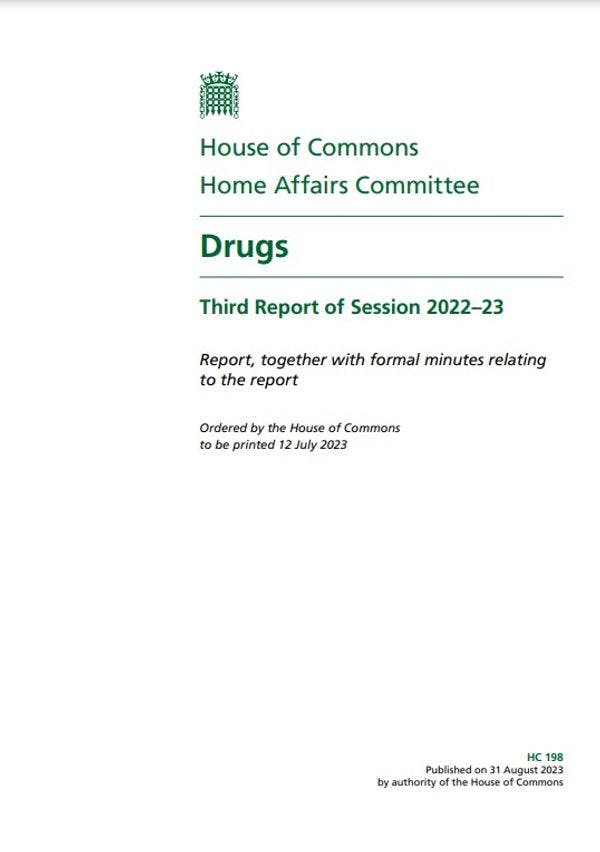Drogues : Troisième rapport de la commission des affaires intérieures du Parlement britannique pour la session 2022-23
La commission des affaires intérieures demande au gouvernement britannique de revoir sa législation obsolète en matière de drogues et d'adopter une approche fondée sur la santé publique. Pour en savoir plus, en anglais, veuillez lire les informations ci-dessous.
Report Summary
Drugs can have a significant and negative impact on people who use drugs, their loved ones and society. Trends in drugs may vary over time but this consequence is constant. Concerningly, drug misuse deaths across the UK continue to increase with opiates playing a significant role in this, and ‘street’ benzodiazepines and polydrug use also playing an increasing role. There were 250 drug misuse deaths per million population in Scotland in 2022—significantly higher than in England, Wales and Northern Ireland. In her Independent Review of Drugs, Professor Dame Carol Black estimated the total cost of drugs to society to be more than £19 billion per year—more than twice the value of the illicit drugs market (an estimated £9.4 billion).
In recent years, the response by the international community and devolved nations to drugs has increasingly focused on responding to drugs through a public health lens. UK policy should ensure that an approach originally and primarily based on criminal justice principles continues to adapt to achieve a proper balance of public health interventions that may reduce illicit drug use in the longer term rather than aiming simply to disrupt demand. We believe that this approach would be best supported by making drug policy the joint responsibility of the Home Office and the Department of Health and Social Care, with a minister sitting across both departments.
The main piece of legislation controlling drugs in the UK—the Misuse of Drugs Act 1971—is more than 50 years old. It is in need of review. Further, a full review by the Advisory Council is required on whether the most commonly controlled drugs in the UK are correctly classified and scheduled (under the Misuse of Drugs Regulations 2001), based on the evidence of their harms.
The Government’s latest drugs strategy, ‘From Harm to Hope: A 10-Year drugs plan to cut crime and save lives’ (the 10-Year Drugs Strategy) signals a shift towards recognising the need for a holistic response to drugs that not only aims to tackle the illicit drug market but also supports people who use drugs, their loved ones and society. However, the Government’s response could go further by adopting a broader range of public health-based harm reduction methods in tandem with its support of law enforcement efforts to tackle the illicit drugs market.
We support the use of diamorphine assisted treatment supported by psychosocial support as a second-line treatment for people with a chronic heroin dependency. We visited a centre in Middlesbrough and saw the dramatic and positive effect this treatment had on the lives of a small group of people who had used drugs and, albeit on a small scale, to local crime reduction. Disappointingly, such treatment programmes are few and controversial, and the Middlesbrough programme lost its funding. The Government should provide centralised funding for such programmes.
Safe consumption facilities, where people who use drugs may do so in safe, secure surroundings, may also reduce harm and deaths, but the status of such facilities is uncertain because of the restrictive regime in place under the 1971 Act. We recommend that the Government support a pilot facility in Glasgow and create a legislative pathway to enable more.
A national drug checking service in England could enable people to anonymously test samples of drugs, again preventing harm and potentially death. We recommend the Government establish a drug checking service, taking into account the experience of Wales. We also recommend the expansion of on-site drug checking services at temporary events such as music festivals and in the night-time economy through the creation of a dedicated licensing scheme. The power to issue such licences could include the devolution of power to grant licences to local authorities.
These public health and harm reduction interventions must be balanced with the role of police in applying the law. The police can also have a role in aiding prevention of drug use and treatment of harms. Scotland’s pioneering programme of having all police officers carry naloxone (a nasal spray or injection that can be administered immediately to reverse the effects of an opioid overdose) should be rolled out elsewhere in the UK as a straightforward means of saving lives. The police can also play an important role in diverting young people who have committed low-level drug-related offences away from the criminal justice system. We support greater standardisation of police-led diversion across England and Wales, to avoid a ‘postcode lottery’ in the treatment of such offenders.
